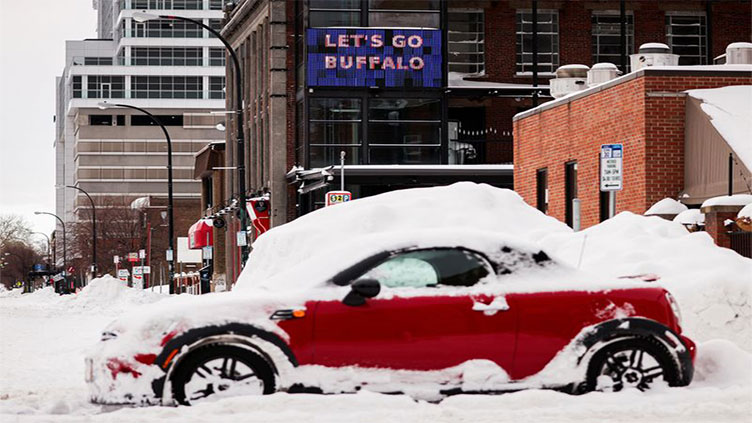Warmer weather on the way for western New York after deadly blizzard

World
Western New York was hardest hit by an Arctic deep freeze and storm.
BUFFALO (Reuters) - Thousands of western New Yorkers were digging out from under four feet of snow (1.2 meters) dumped during a deadly Christmas blizzard, even as the National Weather Service predicted a final two inches of snow on Tuesday.
Western New York was hardest hit by an Arctic deep freeze and storm front that extended over most of the United States for days as far south as the Mexican border.
During the worst of the storm, "we would look out the window and it was blowing so much that we couldn’t really tell if we were getting any accumulation, but when it finally settled we had a lot of work to do," said Jim Nowak, who was out doing his best to shovel heavy snow on Tuesday.
NWS meteorologist Bob Oravec predicted two more inches would fall in Western New York Tuesday, but said that was "probably the last.
"It ll be warming up soon. By Thursday the high will be 46 (8 degrees Celsius) . By Saturday it ll be 54 (12 C) ," said Oravec, who is with the NWS Weather Prediction Center in College Park, Maryland.
Tuesday remained cold, with a high of 28 F (minus 2 C) and a low of 20 F (minus 6 C), Oravec said.
Across the country, at least 60 lives have been lost in weather-related incidents in recent days, NBC News said.
Buffalo, New York state s second largest city, was ground zero for the blizzard that took shape on Friday. Governor Kathy Hochul called it an "epic, once-in-a-lifetime" weather disaster.
County officials reported 28 storm-related deaths in Erie County, including 20 in Buffalo, and one in neighboring Niagara County.
Some of those who died were found frozen in cars, others in snowbanks outside, and others from medical emergencies such as cardiac arrest while shoveling snow, said Erie County s chief executive Mark Poloncarz.
"We re recovering from the worst storm I ve ever seen, certainly in terms of death from mother nature s wrath," he told reporters Tuesday.
The county issued a "Shovel Smart" alert warning that the over-exertion from "shoveling heavy, wet snow can cause back injuries and heart attacks."
Hundreds of electric company linemen were out restoring power, and Poloncarz said on Twitter that about 4,500 customers remained without electricity. Road crews cleared downed trees with chain saws and removed snow from at least one lane so emergency crews could get through main roads.
A driving ban for residents remained in effect for all of Buffalo. Poloncarz, speaking at a press briefing Tuesday, urged residents to stay home and the curious to stay away.
"Too many people are ignoring the ban," he said. "Please, please, please do not drive in the city. It s ugly right now."
He said people were driving into the city "who want to just look at the snow."
The county has called in 100 military police from the state National Guard as well as officers from New York City to help manage traffic, sending residents on the road home and turning away motorists trying to get into the city.
"Please stay out of the city of Buffalo," he said.
Buffalo residents with snowplows attached to the fronts of their jeeps and pickup trucks helped clear side streets Tuesday. People walked a mile or more in the lanes cut by snowplows in to get to mini-markets and grocery stores that are beginning to open.
Southwest Airlines Co LUV.N led U.S. airline cancellations again as the harsh winter weather grounded planes and left some workers unable to tend to jets, disrupting holiday travel for many. Southwest had canceled 2,589 flights as of Tuesday 2.25 pm ET or roughly two-thirds of its schedule, representing 86% of all U.S. airline cancellations, according to tracking website FlightAware.
In metro Atlanta, dusted by rare snowfall on Monday night and early Tuesday, the weekend’s bitter cold caused pipes to burst. Residents were stranded in their homes and without water and some roads were slick with ice.
Several residents had to be rescued from an Atlanta apartment building after a burst pipe flooded the first floor.
In Jackson, Mississippi, plagued with a failing water system, the Clarion Ledger reported that the freeze led to broken water pipes, low water pressure and a citywide boil-water notice.
Jackson Mayor Chokwe Antar Lumumba declared a local state of emergency on Monday. Water distribution stations were set up.
About 122,000 homes were without power across the United States on Tuesday, down from a peak of 1.8 million on Saturday, according to PowerOutage.us. About 72% of those still without power were in Oregon and California. The California-Oregon border area has seen strong winds and heavy rains this week.

